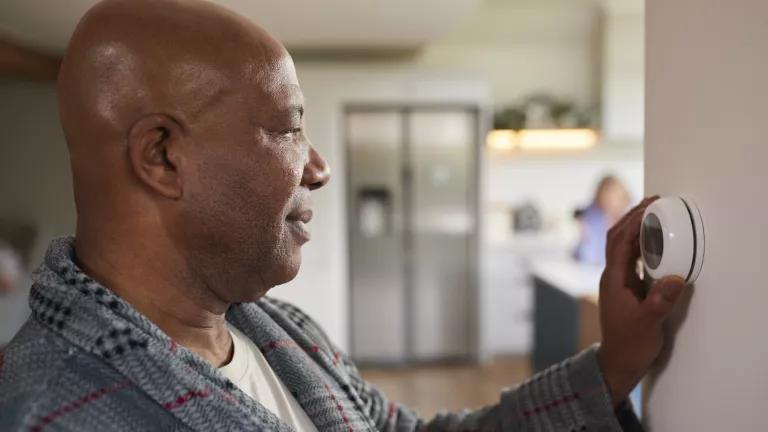Dominion Slow-walks Efficiency & Keeps Their Rates High
Dominion's High Rates Could be Lowered if the SCC Removes Dominion's Senseless Limits on Good Efficiency Programs

Virginia Families Laboring Under Dominion's High Rates Can be Protected if the SCC Removes Dominion's Senseless Limits on Commonsense Energy Efficiency for Households
Virginia’s expensive, decade-plus experiment under Dominion “re-regulation” hit an ignominious milestone today, raising anew whether the Commonwealth should simply return to the normal, good-old-fashioned monopoly regulatory oversight we did just fine with before.
Dominion’s putative regulators at the State Corporation Commission (SCC) today commenced review of the Company’s latest annual energy efficiency package. Such a proceeding would normally be a humdrum, nothing-to-see-here affair: energy efficiency is so commonsense and good for lowering customer bills (and climate pollution) that lately there’s been nothing to contest.
This proceeding is a striking one, however. Dominion should be doubling down with its largest efficiency proposal yet, to tackle high rates that now exceed those of every vertically-integrated utility in neighboring regulated states.
But apparently it’s opposite day over at Dominion:
Despite its high rates and their opportunity to help struggling Virginians navigate inflated electric bills soon to be in the Top 5 highest in America, Dominion instead turned in the smallest efficiency proposal ever made by the Company (on a dollar-for-dollar, program-by-program basis; that is, 11 “demand side management” programs, divided by a total of $162 million, and discontinuing after five years). For a bit of context, Dominion collects about a whopping $3 billion from its captive customers every year, meaning this tiny efficiency investment to help customers represents just 1% of Dominion's annual collections.
Such an underwhelming filing, at the exact wrong time, makes one thing loud and clear: Dominion is officially slow-walking its deployment of customer-friendly efficiency. Why? To avoid interfering with its pitch to the Wall Street shareholders that own the monopoly that Dominion will deliver billions worth of far more costly but lucrative new steel-in-the ground. In other words, why help Joan or Johnny Virginia insulate their home and lower their bills, when Joan can instead underwrite, through her monthly bill payments, Dominion's profitable new power plants that will pump out more juice to heat her drafty old place?
The paltry efficiency filing before the SCC is particularly telling, as it is the first substantive test of Dominion’s sincerity in being a truly “clean energy company." So far, Dominion is flunking the sincerity test: efficiency is the cleanest energy of them all. Instead. as it crowed to Wall Street, Dominion simply sees Virginia as “the largest regulated decarbonization investment opportunity in the country.” Treating Virginians as a cash cow and shirking efficiency in favor of new “investment opportunities” will drive rates and bills even higher, and just as importantly blow Virginia’s single best and easiest decarbonization opportunity to address climate change.
Dominion’s efficiency slow-walking comes into focus when looking at just how few customers were reached by its efficiency programs: 3% of Dominion’s customers in 2019 (or just 85,000 of Dominion’s 2.6 million Virginia customers).
And unfortunately, I am one of those 97 out of 100 Dominion customers who has not been reached by a single Dominion efficiency program, despite being an ideal customer. My house is completely electric (i.e. no fossil fuels, like fracked methane or liquid petroleum for heating or cooking). I therefore therefore have myriad options to make my home cheaper and more efficient with better HVAC, hot water, insulation, kitchen appliances, lighting, and thermostats. And despite this rich opportunity to lower rates and bills, Dominion has not managed contact me a single time (ideally through my monthly bill) to take part in their modest offerings. So instead, like most Joan and Johnny Virginias, my home is less efficient, and as a result, we Virginians pay higher rates.
The Good News
The SCC can thankfully fix this Dominion efficiency underinvestment problem, and without legislative involvement, by simply eliminating Dominion’s reliance on nonsensical budget ceilings that strangle efficiency programs in the crib. Currently, Dominion proposes good, commonsense efficiency measures, but in the same breath “caps” every single one of them by limiting the investment under a very low funding ceiling (indeed, in this case the lowest per program amount ever).
(While the SCC can and should act now to correct these egregious caps, based on Dominion's persistent recalcitrance when it comes to doing anything meaningful at scale on efficiency, the General Assembly must pass legislation to force the utility to get its act together.)
As explained in NRDC’s comments and testimony to the Commission, here’s why budget caps on efficiency programs are backwards: pre-determining random budget limits for cost-effective efficiency programs is like building a high-performance sportscar from scratch, sinking labor, material, design, and fabrication costs to roll it off the assembly line, only to randomly limit the car to drive a max of just 55 MPH, only providing enough gasoline to drive just 10,000 miles, and then scrapping it at the junkyard. A lot of work, minimal reward.
Put another way, Dominion’s low budget ceilings on efficiency is like building a dispatchable electric generating unit, at a cost of $1 billion ratepayer dollars, but then only allowing it to run 50% of the year, and then junking it after just five years of service, regardless of how well it could have kept performing.
Rather than knee-capping their own programs, in favor of Dominion’s more expensive, lucrative steel in the ground, the SCC should require Dominion simply do what utilities do in normally regulated states: aspire to capture all cost-effective savings from each efficiency measure, reaching as many customers as is feasible, as is determined through straightforward “potential studies,” and then design each program to tap that full savings potential, without arbitrary cost limits or 5-year cliffs. And after those efficiency programs have ramped up, simply use "evaluation and verification" data (the topic of another important proceeding at the SCC), to confirm that the programs are delivering savings as designed, and if not, adjust accordingly. (And that includes maybe capping or even discontinuing poorly performing programs, but based on actual real-world, after-the-fact performance data.) It just ain't rocket science, and in fact it's what all those utilities in surrounding regulated states do, to help keep their rates lower than Dominion's.
If the SCC required Dominion to do so, you can bet your bottom dollar (hopefully one saved through a Dominion efficiency program!) that Dominion will serve far more than just 3 out of a hundred of its customers with good, bill-lowering efficiency programs. And maybe, just maybe, Dominion’s excessively high rates will start to come down as well.
So here’s to hoping the Commission abandons, in this efficiency proceeding, its antiquated and harmful reliance on arbitrary cost ceilings (which, for the record, began at the Commission’s behest over a decade ago, and with which Dominion is apparently only too happy to acquiesce).
If the SCC doesn’t, and Dominion continues to shortchange efficiency in service to its shareholder owners on Wall Street, rather than serving Joan and Johnny Virginia, it may well be time to consider the wisdom of returning Virginia back to traditional monopoly regulation, and the rightsized electric rates that come with it.




